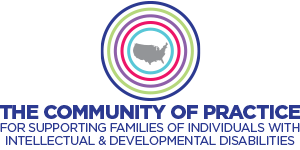Impact of the CoP for Supporting Families
CoP member states leverage the national network, connecting with like-minded peers across and within states, to learn about and exchange strong and innovative practices to inform, enhance, and further current initiatives and priorities for system change.
Our Overall Goal
The overall goal of supporting families, with all of their complexity, strengths and unique abilities is so they can best support, nurture, love, and facilitate opportunities for the achievement of self-determination, interdependence, productivity, integration, and inclusion in all facets of community life for their family members (AIDD National Agenda on Family Support Conference, 2011).
Through participation in the National Community of Practice for Supporting Families (CoP), member states have built capacity and made several system changes to better support families. Participating states have changed the front door into the system, improved cultural considerations in supporting families, guided and influenced policymakers, helped shape waivers and other Medicaid authorities (including shifting how professionals and families approach individual support planning) to focus on supporting families and individuals throughout the lifespan. Through harnessing grassroots momentum, created through enhancing family networks, conducting outreach, and strengthening the role of families in all models of supports and services, states have partnered with families for lasting change.
Innovation Area Overview
Specifically, the National Community of Practice on Supporting Families has – and continues to – enhance policy, practice, systems, and community change in some of the following Innovation Areas:

Family and Self-Advocate Engagement:
Building structures and opportunities to ensure active representation and engagement of self-advocates and families at a systems level, including building or enhancing self-advocate and family groups and/or networks.

Cultural and Linguistic Competency:
Enhancing awareness of and improving cultural considerations in the development and implementation of outreach strategies and use of person/family centered frameworks and tools when working with diverse cultural and linguistic communities.

Implementation and Practice:
Implementing day to day practices that are person centered and consider the context of the family and community, including integrating person and family centered frameworks and tools into planning processes and capacity building strategies with self-advocates, families, and professionals.

System Design and Quality:
Developing/aligning Medicaid waivers/authorities, analyzing needed policies, recommending changes, and engaging in overall system design and structural transformation efforts across programs that are centered on the person within the context of family and community.
Benefits of Participation
State teams report the following observation of the benefits of participation in the shared learning and technical assistance provided by the National Community of Practice for Supporting Families:
Enhancing Factors Contributing to
System Change
- Diverse partners are engaged around a shared purpose and consensus
- Diverse strategies implemented to build knowledge, which leads to new ways of thinking and changes in action
- New and existing initiatives targeted and leveraged for change
- New goals, strategies, and operations identified
Completing Specific Activities for Supporting Families
- Developed self-advocacy curriculum
- Created and disseminated information
- Created additional strategies and platforms for engaging with individuals and families
- Trained case managers
- Developed materials with more emphasis on community and less on services
- Aligned rules and policies across programs
Resulting Outcomes of System Change
Efforts and Activities
- Raised expectations for families
- Improvements in existing services available to support families
- Improved connections between consumers and their communities
- Strengthened or formed new partnerships
- Families and self-advocates report increased satisfaction
- Increased involvement of families and self-advocates
- Increased community support
- Measure outcomes in new ways
- Increasing efficiency for people accessing services
- Implemented new waivers, expanding supports to families
